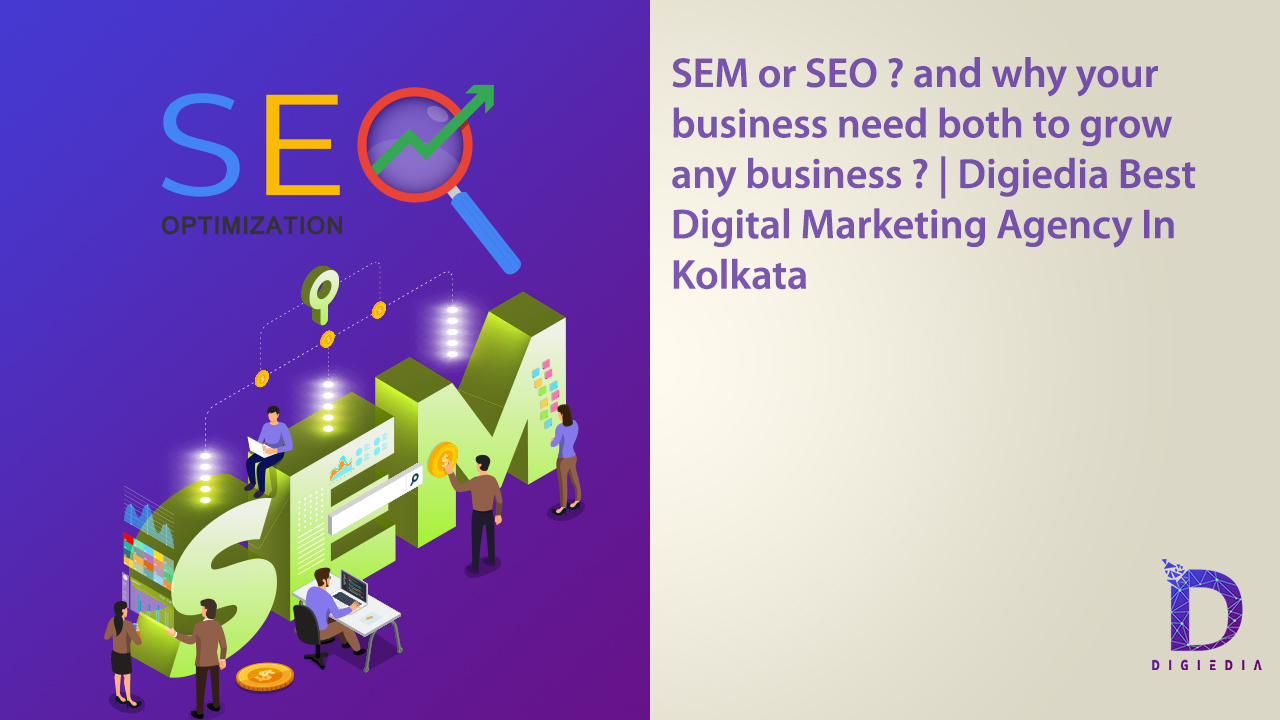
SEM or SEO ? and why does your business need both to grow any business?
- DIGIEDIA
- Blogs, Digital Marketing, SEO (Search Engine Optimisation)
- 27 October 2022
- No Comments
To understand whether you need SEM or SEO, or both for your business to grow, you must first know what SEM or SEO is, and how is it different from each other.
SEM
The full form of SEM is Search Engine Marketing. SEM refers to the technique of enhancing website visibility on search engine results pages through paid search advertising. SEM is concerned with obtaining a link to a brand’s website at the top of a search engine results page (SERP) through paid advertising. For those who are unfamiliar, this refers to the clickable links that display above organic search results and are labeled as ‘ads.’
SEM methods include pay-per-click advertising, paid search, display advertising, and retargeting advertisements. Paid advertising may successfully raise brand visibility on search engine results pages, potentially increasing site traffic and conversion rates. Even if it is not essential, SEM may provide vital and different possibilities for efficiently advertising your small business through search engine inquiries for specific items or services. By implementing efficient SEM campaigns, you may earn targeted traffic through sponsored links that appear above organic search results. Purchasing sponsored advertisements helps ensure that information about your small business appears at the right time and in the right place. SEM produces immediate results by concentrating on a market that is already interested in the goods, services, or information that your firm has to offer. When tiny businesses compete with large corporations, they gain a competitive edge and create a significant return on investment.
Because the cost can be easily modified to meet any budget or schedule, SEM is a versatile and cost-effective strategy that any size organization can realistically adopt. SEM campaigns are useful for client acquisition, with 74% of internet users performing local searches and 61% of those searches resulting in purchases.
Here are some advantages of SEM –
- Flexibility and scalability
The budget for SEM advertising may be adjusted to avoid overspreading. Because SEM is versatile and highly scalable, it is ideal for businesses to use it in their marketing efforts and bid on relevant keywords to maximize conversions.
- Prompt results
SEM produces leads faster than SEO since it quickly increases the brand’s web presence. This is the most effective technique, and as a result extremely beneficial, for small businesses to immediately contact more prospective customers.
- Mobile-friendly marketing
SEM is appropriate for mobile marketing. Many internet users only interact with companies and search engines via their mobile devices.
SEM is designed to appear on mobile devices, and search engine advertisements are geared to appear effectively on mobile devices. In the era of mobile phones where things can be done through few clicks on mobile, you are missing marketing opportunities if you are not attempting to make your website mobile-friendly.
- Convenient to change
With a search engine ad, you may update the ad’s content whenever you want. You may make adjustments based on the metrics of the search engine ad. If you believe that the keywords or any other aspect of the ad’s content should be modified, you can do it on the fly. This is one of the most significant benefits of SEM. Because you can make adjustments whenever you choose, you can stay miles ahead of your competitors and engage with your audience at all times.
- Targeted marketing
SEM allows you to target people depending on their location. You may make advertising in many languages and choose where they will show; you can pick a nation, city, or even a particular location anywhere in the world.
SEO
The purpose of SEO is to increase the amount and quality of visits to your website through natural search engine results. It is an advanced set of digital techniques, methods, and practices. Small company owners may increase traffic from their target market by capitalizing on customer searches. SEO is critical for increasing your brand’s online visibility and fortifying your company’s position against the competition. A website that is difficult to find cannot benefit or provide results for any business. SEO has several advantages, such as the ability to increase your website and enlarge its audience, allowing you to communicate with clients more effectively and raise brand recognition. Small companies will grow faster if they are easy to locate through search engines. By responding to their demands using solid SEO strategies, you can create a website, content, and marketing that customers can easily find and use.
Some benefits of using SEO are –
- Cost effective
The best quality about SEO, as long as you know how to do it correctly, is that it is not expensive. As a result, even small businesses and startups with little resources may benefit from digital marketing.
- Long-term online exposure
Brands work hard to establish a long-lasting digital presence for their organization. To increase SERP rankings, they adhere to SEO principles when developing high-quality content for their website. After using digital marketing strategies, the website is now simpler for search engines to find. The exposure you get using SEO is long-term.
- Holistic development of your brand
Investing in search engine optimization is not only necessary for your company’s growth, but it is also one of the most beneficial investments you can make. Search engines strive to accomplish their jobs as efficiently as possible, and one way they achieve this is by directing users to websites and materials that are most relevant to the information they seek. This is decided by the content of your website, how quickly it loads, how frequently it is linked to other trustworthy internet sites, and the user experience, which includes, among other things, design, navigation, and bounce rate. Keyword abuse, buying links, giving poor user experience, and similar behaviors are not supported by search engines. One of the most significant components of your website’s branding is the name you pick for its domain. Instead of utilizing sub-domains like events.example.com, you should use sub-directory root domains like events.example.com. Another excellent domain name method is to use consistent domains and keywords in the URL. Title tags and meta descriptions must be included in your content.
- Higher CTR
In comparison to SEM, SEO has a higher click-through rate (CTR). Continuous attempts to improve content quality over time raise the website’s worth, resulting in a boost in the number of website visits.
SEM or SEO?
If you are doubting which method to implement in your marketing strategy, SEM or SEO, it is essential for you as a marketer to know that both are important for your company’s growth. Individually, SEM or SEO undoubtedly produces worthwhile results. These strategies are typically presented as two unique but viable options, leaving it up to business owners to determine which will be more beneficial for their specific market and location. To generate more income, it is recommended that you complement one valued entity with another rather than pitting them against one another.
SEO delivers critical organic results that are meant for long-term success, but it takes work and dedication over time. SEM delivers quick, purchased results that bring targeted visits, but it requires a solid, optimized basis to convert quick buys into dedicated customers.
The goal of both SEM or SEO is to drive more visitors to your website. Although their aims have varied timeframes, they all aspire to reach the same result. The consistent effort and hard work necessary for search engine optimization success will only assist search engine marketing reach rapid, strategic, and purchased results. SEM quickly monetizes targeted keyword searches; SEO provides the basis for converting and retaining the visitors brought in by SEM approaches.
Combining SEO and SEM methods with precision will result in a more successful digital marketing strategy with demonstrable results. Small companies may get ahead of their larger competition by investing in a complete digital strategy that is built for both quick development and long-term success. Leveraging data and insights from both SEO and SEM for increased audience presence can yield better results. Understanding how to integrate SEO and SEM is a critical method for improving website traffic. SEM produces bottom-of-funnel leads, but SEO produces top-of-funnel prospects.
